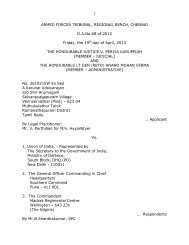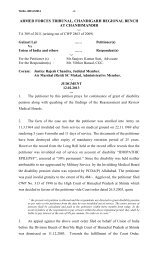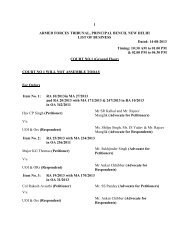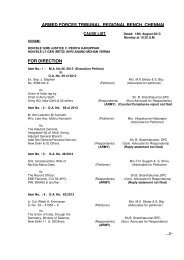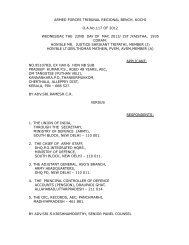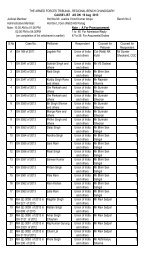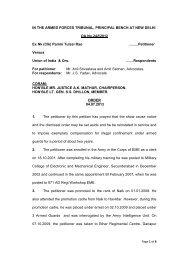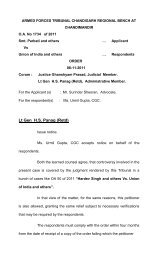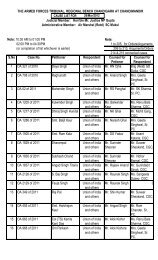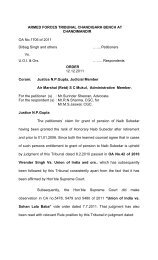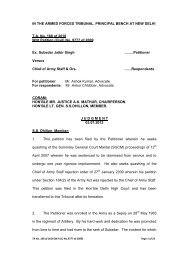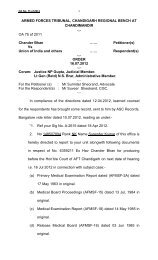O R D E R - Armed Forces Tribunal
O R D E R - Armed Forces Tribunal
O R D E R - Armed Forces Tribunal
You also want an ePaper? Increase the reach of your titles
YUMPU automatically turns print PDFs into web optimized ePapers that Google loves.
FORM NO – 21<br />
(See Rule 102 (1)<br />
ARMED FORCES TRIBUNAL, KOLKATA BENCH<br />
APPLICATION NO : TA 89 OF 2010 {WP 15633(W)/2007}<br />
THURSDAY, THIS TWENTY-FIRST DAY OF APRIL, 2011<br />
CORAM : Hon’ble Mr. Justice Sadhan Kumar Gupta, Member (Judicial)<br />
Hon’ble Lt. Gen. K.P.D. Samanta, Member (Administrative)<br />
Harun-Al-Rashid son of Abdul Rakib retired<br />
Subedar , JC-188326L has retired from Signals<br />
Records , Jabalpur ( M.P) and mpw residing at<br />
Vill and P O Salinda Tehshil-Kandi, Dist .<br />
Mursidabad, W B Pin 742401<br />
-VS –<br />
……….. Petitioner<br />
1. Union of India through the Secretary , Ministry of<br />
Defence , South Block New Delhi 110001.<br />
2. The Additional Director General, Personnel Services,<br />
Adjutant General‟s Branch , Intrigrated Head Quarter of<br />
Ministry of Defence (Army) , DHQ P O New Delhi –<br />
110011.<br />
3. The Principal Controller of Defence Accounts (P)<br />
Allahabad.<br />
4. The Records Signals, Jabalpur ( M P ) Pin 482001<br />
For the petitioner : Mr. Kalyan Sarkar, Advocate<br />
For the respondents : Mr. Souvik Nandy, Advocate<br />
O R D E R<br />
Per Justice Sadhan Kumar Gupta, MEMBER (Judicial)<br />
………. Respondents<br />
The applicant initially filed the writ petition before the Hon‟ble High Court<br />
at Calcutta under Art. 226 of the Constitution of India. Subsequently, due to<br />
advent of the <strong>Armed</strong> <strong>Forces</strong> <strong>Tribunal</strong> Act, 2007, said writ petition was transferred<br />
to this <strong>Tribunal</strong> for disposal.
2<br />
2. The case of the applicant, in short, is that he was enrolled in the Army<br />
and retired from service on and from 3l.12.2004. After his retirement, normal<br />
pension was sanctioned in his favour.<br />
3. According to the applicant, while he was posted in Amritsar, at that time<br />
on 5. 7. 1992, he met with an accident within the Cantonment area. The said<br />
accident took place due to the negligent driving of an army driver of a military<br />
vehicle. As a result of this accident, the applicant was seriously injured and had<br />
to be admitted in the Amritsar Army Hospital and it was declared that he<br />
sustained injury of “Compound Fracture Tibia/Fabula”. Immediately after the<br />
accident, a court of enquiry was held. Although the said court of enquiry held that<br />
the accident was caused due to the negligence on the part of the Army driver,<br />
still, it was of the opinion that the injury, as sustained by the applicant, was not<br />
attributable to military service. The claim of the applicant praying for disability<br />
pension was rejected by the authority and it was communicated to him by the<br />
letter dt. 19.2.2005. In the said letter it was observed that as per injury report dt.<br />
8.7.92, it was found that the accident was not attributable to the military service<br />
and as such, the claim of disability pension was not admissible. The applicant<br />
claims that due to the accident, his right leg was shortened by 1.5 cm and as a<br />
result of that he is unable to perform his day to day activities and for that he is<br />
dependent upon his wife and others.<br />
4. The applicant submitted an appeal with the appropriate authority stating all<br />
these facts and also that the injury was caused due to careless driving by an<br />
army driver inside the cantonment compound and the finding of the court of<br />
enquiry was also to the effect that due to the negligence of the army driver such<br />
accident took place. As such, the applicant prayed that the appellate authority<br />
should consider this aspect and should grant him disability pension to which he is<br />
legally entitled. Ultimately on 31.5.2007, the applicant was informed that the first<br />
appellate authority, by the order dt. 29.3.2007, was pleased to reject the said<br />
appeal on the ground that the said accident was not attributable to military
3<br />
service as per rule 12 of the Entitlement Rules for Casualty Pensionary Awards,<br />
1982. Being aggrieved and dissatisfied with such decision of the appellate<br />
authority, the applicant filed the writ petition, which has now been transferred to<br />
this <strong>Tribunal</strong> for disposal.<br />
5. The claim of the applicant was contested by the respondents by way of<br />
filing counter affidavit wherein the allegations, as made in the application, were<br />
denied on all material points. However, the fact of the injury sustained by the<br />
applicant was not denied by the respondents. At the same time, they have<br />
claimed that since the injury could not be attributable to military service, so the<br />
question of granting disability pension does not arise at all and as such, his claim<br />
was rightly rejected. They have prayed for dismissal of the application.<br />
6. Against this counter affidavit, the applicant has filed a rejoinder wherein he<br />
has further elaborated his claim for his entitlement to get disablement pension<br />
and in support of that claim, several decisions of the Apex court and High Courts<br />
have been relied upon.<br />
7. We have taken into consideration the submissions made by the ld.<br />
Advocates for both the sides as well as the documents, which have been<br />
annexed in connection with this application. Admittedly, the applicant was injured<br />
in the year 1992 while he was driving a scooter for going to the local market for<br />
purchasing daily necessities at about 5.15 PM. It is the further admitted position<br />
that at that time, the applicant met with an accident, as his scooter collided with<br />
an Army heavy vehicle. It is also not in dispute that as a result of this accident,<br />
the applicant was seriously injured and was admitted in the Army Military<br />
Hospital where his right leg was shortened by 1.5 cm. It appears from the<br />
documents, as available in the record, that the applicant was placed before the<br />
Medical Board, who opined that the disability sustained by the applicant was 30%<br />
and it was for life. However, this Medical Board was of the opinion that this injury,<br />
as sustained by the applicant, could not be said to be attributable to military
4<br />
service. From the documents, it further appears that after the accident, a court of<br />
enquiry was held and the opinion of the court of enquiry was to the effect that the<br />
accident was caused due to the negligence on the part of the army driver, who<br />
was driving the army heavy vehicle and the said accident took place inside the<br />
military campus. Now, in spite of all these things, the concerned authority did not<br />
grant disability pension in favour of the applicant, presumably, due to the opinion<br />
of the Medical Board. Normally, the opinion of the Medical Board should not be<br />
interfered with without any cogent reason. However, it appears from the opinion<br />
of the medical Board that the disability sustained by the applicant was 30% and it<br />
was recommended for life. Therefore, there cannot be any dispute in respect of<br />
this part or the opinion. However, the Medical Board opined that such injury could<br />
not be attributable to military service. We must remember that it is not a case of<br />
any disease being developed during the course of military service. It was an<br />
accident resulting such injury and as such, whether it is attributable to military<br />
service or not, that should not come within the purview of the Medical Board‟s<br />
opinion. The concerned authority is to consider this aspect as per provisions laid<br />
down in the Rules for Casualty Pensionary Awards of 1982. The main question<br />
that has to be considered is, whether at the material time, when the accident had<br />
occurred, the applicant should be treated to be “on duty” or not. In this respect,<br />
the ld. Advocate for the applicant has heavily relied upon a Full Bench decision of<br />
the Punjab & Haryana High Court, as reported in 2011(1) ESC (P&H) 33 (Union<br />
of India through Secretary, M/o Defence, New Delhi & Ors –versus-<br />
Khushbash Singh, Ex. Naib Subedar, etc. etc.). The Hon‟ble Full Bench of<br />
the Punjab & Haryana High Court while delivering the judgement relied upon<br />
series of decisions of the Hon‟ble supreme Court as also of other High Courts.<br />
This Full Bench decision, in our opinion, must be treated to be an important<br />
guideline for coming to a decision, so far as this application is concerned. In the<br />
said decision, the Hon‟ble Full Bench was pleased to quote different provisions of<br />
Army Pension Regulations and entitlement rules for Casualty Pensionary
5<br />
Awards, 1982. It may be pointed out here that in order to grant disability pension,<br />
para 173 of Army Pension Regulations, 1961 has to be followed. Said para 173<br />
runs as follows :-<br />
“Unless otherwise specifically provided, a disability consisting of<br />
service element and disability element may be granted to an individual,<br />
who is invalidated out of service on account of disability, which is<br />
attributable or aggravated by Military Service in non-battle casualty and is<br />
assessed at 20% or over.”<br />
8. This provision is to be looked into along with the provisions of Entitlement<br />
Rules for Casualty Pensionary Awards of 1982. We have already pointed out that<br />
the main thing that is to be considered, so far this matter is concerned, is as to<br />
whether the applicant should be treated to be “on duty” when the accident took<br />
place or not. In this respect, rule 12 of the said Rules for Casualty Pensionary<br />
Awards, 1982 is most relevant, which runs as follows :-<br />
“12. Duty- A person subject to the disciplinary code of the <strong>Armed</strong><br />
<strong>Forces</strong> is on „duty‟ :<br />
a. While performing an official task or a task, failure to do which would<br />
constitute an offence triable under the disciplinary code applicable<br />
to him.<br />
b. When moving from one place of duty to another place of duty<br />
irrespective of the movement.<br />
c. During the period of participation in recreating and other unit<br />
activities organized or permitted by service authorities and during<br />
the period of travelling in a body of single by a prescribed or<br />
organized route.<br />
Note :-<br />
a. Personnel of the <strong>Armed</strong> forces participating in -<br />
i. Local/National/International sports tournament as member of<br />
service team, or<br />
ii. mountaineering expeditions/gliding organized by service authorities<br />
with the approval of service Headquarters will be deemed to be<br />
“ON DUTY” for purpose of these rules.<br />
iii. Personnel of the <strong>Armed</strong> <strong>Forces</strong> participating in the above-named<br />
sports tournament s or in privately organized mountaineering expeditions<br />
or indulging in gliding as a hobby in their individual capacity , will not be<br />
deemed to be on duty for the purpose of these rules, even though prior<br />
permission of the competent service authorities may have been obtained<br />
by them.
Note 2.<br />
6<br />
The personnel of the <strong>Armed</strong> <strong>Forces</strong> deputed for training at courses<br />
conducted by the Himalayan Mountaineering Institute, Darjeeling shall be<br />
treated on par with personnel attending other authorized professional<br />
courses or exercises for the Defence Service for the purpose of the grant<br />
of disability/family pension on account of the disability/death sustained<br />
during the courses.<br />
d. When proceeding from his duty station to this leave station or<br />
returning to duty from his leave station, provided entitled to travel at public<br />
expenses i.e. on railway warrants, on concessional vouchers, on cash TA<br />
is (irrespective of whether railway warrant/cash T.A is admitted for the<br />
whole journey of for/ a portion only)k , in Government transport or when<br />
road mileage is paid/payable for the journey.<br />
e. When journeying by a reasonable route from one‟s quart er to<br />
and back from the appointed place of duty , under organized<br />
arrangements or by a private conveyance when a person is entitled to use<br />
service transport but that transport is not available.<br />
f. An accident which occurs when a man is not strictly “On Duty” as<br />
defined may also be attributable to service, provided that it involved risk<br />
which was definitely enhanced in kind or degree by the nature, conditions,<br />
obligations or incidents of his service and that the same was not a risk<br />
common to human existence in modern conditions in India. Thus for<br />
instance , when a person is killed or injured by another party by reason of<br />
belonging to the <strong>Armed</strong> <strong>Forces</strong> , he shall be deemed “On Duty” at the<br />
relevant time. This benefit will also be given more liberally to the claimant<br />
in case occurring on active service as defined in the Army/Navy/Air Force<br />
Act.”<br />
9. The Hon‟ble Full Bench of the Punjab & Haryana High Court took into<br />
consideration the said provisions of the Rules and thereafter came to the<br />
conclusion that even in case a person is on casual leave and he meets with an<br />
accident, then also, he should be considered to be „on duty‟ and should be taken<br />
as his disability attributable to military service. The Hon‟ble Full Bench in para 10<br />
of the said decision observes as follows :-<br />
“…… We have already outlined a deeming fiction obtained through the<br />
definition of “ON DUTY‟ as specified in clause 12 of the Appendix II. They<br />
are simpler situations where although not actually on duty but by a fiction,<br />
the Army Personnel would be treated on duty and a disability arising<br />
during such time, as for example, when a person suffers a disability on<br />
transit from his duty station to the leave station when he was travelling by<br />
train, the disability should only be taken as attributable to army duty.”
7<br />
10. According to the Full Bench, such a person could not be denied the<br />
disability pension. In the said decision, several examples were cited in order to<br />
come to the conclusion that in such a case, the disability arising in a non-<br />
combatant situation may also be taken to be a disability which was aggravated<br />
by military service. The Full Bench further elaborated to the effect that –<br />
“…..According to us, a person on casual leave or annual leave does not<br />
cease to be on military duty and the injury that he sustains in an accident<br />
could only be examined from the context of whether it was inconsistent<br />
with a person in Military Service or not.”<br />
11. So, the ratio, as decided in the Full Bench decision, is to the effect that<br />
even if the person concerned was not performing military job, then by way of a<br />
fiction he should always to be considered to be on duty of military service even if<br />
he was on casual leave and the accident took place in his native place. If a<br />
person, who is on casual leave and sustains injury in his native place, can be<br />
awarded disability pension, as decided by the Full Bench, we fail to understand<br />
as to why a person, who was in the active military service, at the time of the<br />
accident, and who sustained injury inside the military campus and that too, due to<br />
the negligent driving of an army driver who was driving army heavy vehicle and<br />
the finding of the court of enquiry was also to the effect that such accident took<br />
place due to negligence of the said driver, then why such a person should be<br />
deprived of disability pension, as claimed by him.<br />
12. We have already pointed out that the applicant was at that time staying in<br />
the Amritsar Military Cantonment along with his family members and naturally he<br />
must be in the active military service and if he was going at the material time to<br />
the market for purchase of daily requirements, and met with an accident, then, it<br />
cannot be said that since he was at the material time not performing any military<br />
service, so he could not be considered to be „on duty‟, as claimed by the<br />
authorities. If that position is accepted, then it will be an injustice to the person<br />
concerned, who was compelled to stay in the military cantonment area along with
8<br />
his family members in connection with this military service. Such being the<br />
position, we are of the opinion that the injury, as sustained by the applicant, must<br />
be held to have been caused when the applicant was „on duty‟.<br />
13. We have already pointed out that the Medical Board opined that the<br />
applicant sustained injury to the extent of 30% and it was for life. We have<br />
mentioned in the above discussion that it must be held that the injury as<br />
sustained by the applicant, took place while he was „on duty. Under such<br />
circumstances, we are of the view that as per medical opinion, the applicant<br />
should be granted medical disability pension to the extent of 30% and it must be<br />
for life since that injury, as sustained by the applicant, must be considered to be<br />
attributable to military service, as discussed above. To our mind, the application<br />
should be disposed of accordingly.<br />
14. In the result, the application is allowed on contest but without cost. It is<br />
declared that the applicant is entitled to disability pension to the extent of 30% for<br />
life from the date of his discharge. The respondents are directed to pay disability<br />
pension in favour of the applicant along with arrear amount within three months<br />
from the date of communication of this order. If the arrear is not paid within three<br />
months, as mentioned above, then in that event, such amount shall carry interest<br />
at the rate of 8% per annum till the date of actual payment. The impugned order<br />
dt. 29.3.2007 whereby the claim of disability pension of the applicant was<br />
rejected, stands quashed.<br />
15. Let plain copy of this order be handed over to the ld. Advocates for both<br />
the parties.<br />
(Lt. Gen. K.P.D.Samanta) ( Sadhan Kumar Gupta)<br />
Member(Administrative) Member (Judicial)



